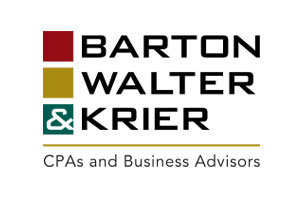Why You Need an Estate Plan (And How an Accountant Can Help)
October 23, 2023 | Barton Walter and KrierYou may have heard of estate planning and figured it wasn’t for you. Maybe you thought you were too young or not wealthy enough to bother. The truth is everyone should have an estate plan. This important set of documents gives you a say in what happens to your possessions after you’re gone and provides other helpful ways to steward your affairs. Continue reading as we explore why an estate plan is so important and how a Certified Public Accountant (CPA) can help with yours.
What is an estate?
The word “estate” may conjure up images of expansive properties and mansions. But in this case, the word has a much broader meaning. Your estate comprises the sum of your possessions, including everything you own, your house, vehicles, bank accounts, investments, and life insurance policies. All these assets must be distributed to people or organizations upon your death.
What is an estate plan?
An estate plan is a set of documents outlining what will happen to your estate after you’re gone, and in some cases, while you’re still alive. A will is the most well-known aspect of this plan, but other documents include trusts, powers of attorney, and life insurance plans.
Why is it important?
An estate plan ensures you have control over who your assets go to. If you die without a will, the courts will undergo a lengthy process to determine how your estate should be divided up. This can lead to your money and possessions going to people you didn’t want to share in your inheritance. And even if your assets go to the people you had in mind, the legal process may draw out indefinitely, preventing your loved ones from receiving funds when they need them most. When you set up an estate plan, you’ll designate beneficiaries to ensure the people you care about receive their inheritance without delays.
How Can an Accountant Help?
One of the key functions of an estate plan is to minimize taxation of your estate upon your death. With their broad range of experiences and vast financial knowledge, accountants can tell you how every decision you make in your estate plan will affect taxes. With their help, you can make the most tax-efficient decisions to ensure your heirs receive as much of your hard-earned money as possible. One such strategy is to create a trust, which transfers assets from your estate to a trustee. These assets are exempt from estate taxes and are passed directly to your beneficiaries. A CPA can also estimate the future value of your estate, using their market knowledge to predict increases or decreases in value. With their financial expertise, the aid of an accountant is invaluable when crafting an estate plan.
Contact Barton, Walter & Krier
The Certified Public Accountants at BWK have a wealth of experience from “Big Four” firms and excel in delivering innovative, personalized solutions for our clients. We specialize in estate planning and wealth transfer, helping you make the most of your inheritance for the ones you care about. Learn more about our estate planning services and contact us today!

